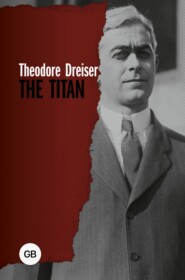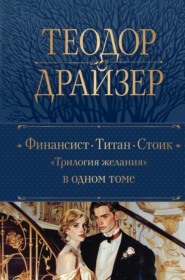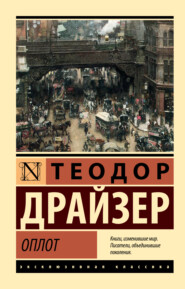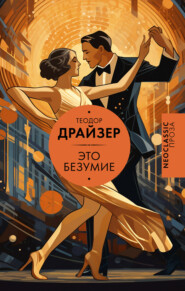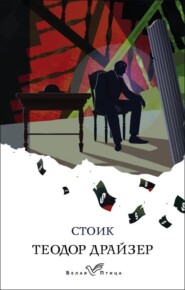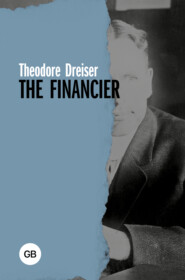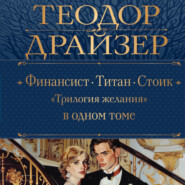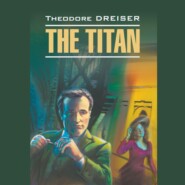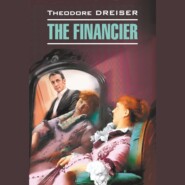По всем вопросам обращайтесь на: info@litportal.ru
(©) 2003-2025.
✖
The "Genius"
Настройки чтения
Размер шрифта
Высота строк
Поля
Eugene had thought that possibly she sang, but he was not prepared for the burst of color that came with her voice. It was not a great voice, but sweet and sympathetic, equal to the tasks she set herself. She selected her music as she selected her clothes – to suit her capacity. The poetic, sympathetic reminiscence of the song struck home. Eugene was delighted.
"Oh," he exclaimed, bringing his chair close to the piano and looking into her face, "you sing beautifully."
She gave him a glittering smile.
"Now I'll sing anything you want for you if you go on like that."
"I'm crazy about music," he said; "I don't know anything about it, but I like this sort of thing."
"You like the really good things. I know. So do I."
He felt flattered and grateful. They went through "Otidi," "The Nightingale," "Elegie," "The Last Spring" – music Eugene had never heard before. But he knew at once that he was listening to playing which represented a better intelligence, a keener selective judgment, a finer artistic impulse than anyone he had ever known had possessed. Ruby played and Angela, the latter rather well, but neither had ever heard of these things he was sure. Ruby had only liked popular things; Angela the standard melodies – beautiful but familiar. Here was someone who ignored popular taste – was in advance of it. In all her music he had found nothing he knew. It grew on him as a significant fact. He wanted to be nice to her, to have her like him. So he drew close and smiled and she always smiled back. Like the others she liked his face, his mouth, his eyes, his hair.
"He's charming," she thought, when he eventually left; and his impression of her was of a woman who was notably and significantly distinguished.
CHAPTER XXI
But Miriam Finch's family, of which she seemed so independent, had not been without its influence on her. This family was of Middle West origin, and did not understand or sympathize very much with the artistic temperament. Since her sixteenth year, when Miriam had first begun to exhibit a definite striving toward the artistic, her parents had guarded her jealously against what they considered the corrupting atmosphere of the art world. Her mother had accompanied her from Ohio to New York, and lived with her while she studied art in the art school, chaperoning her everywhere. When it became advisable, as she thought, for Miriam to go abroad, she went with her. Miriam's artistic career was to be properly supervised. When she lived in the Latin Quarter in Paris her mother was with her; when she loitered in the atmosphere of the galleries and palaces in Rome it was with her mother at her side. At Pompeii and Herculaneum – in London and in Berlin – her mother, an iron-willed little woman at forty-five at that time, was with her. She was convinced that she knew exactly what was good for her daughter and had more or less made the girl accept her theories. Later, Miriam's personal judgment began to diverge slightly from that of her mother and then trouble began.
It was vague at first, hardly a definite, tangible thing in the daughter's mind, but later it grew to be a definite feeling that her life was being cramped. She had been warned off from association with this person and that; had been shown the pitfalls that surround the free, untrammelled life of the art studio. Marriage with the average artist was not to be considered. Modelling from the nude, particularly the nude of a man, was to her mother at first most distressing. She insisted on being present and for a long time her daughter thought that was all right. Finally the presence, the viewpoint, the intellectual insistence of her mother, became too irksome, and an open break followed. It was one of those family tragedies which almost kill conservative parents. Mrs. Finch's heart was practically broken.
The trouble with this break was that it came a little too late for Miriam's happiness. In the stress of this insistent chaperonage she had lost her youth – the period during which she felt she should have had her natural freedom. She had lost the interest of several men who in her nineteenth, twentieth and twenty-first years had approached her longingly, but who could not stand the criticism of her mother. At twenty-eight when the break came the most delightful love period was over and she felt grieved and resentful.
At that time she had insisted on a complete and radical change for herself. She had managed to get, through one art dealer and another, orders for some of her spirited clay figurines. There was a dancing girl, a visualization of one of the moods of Carmencita, a celebrated dancer of the period, which had caught the public fancy – at least the particular art dealer who was handling her work for her had managed to sell some eighteen replicas of it at $175 each. Miss Finch's share of this was $100, each. There was another little thing, a six-inch bronze called "Sleep," which had sold some twenty replicas at $150 each, and was still selling. "The Wind," a figure crouching and huddling as if from cold, was also selling. It looked as though she might be able to make from three to four thousand dollars a year steadily.
She demanded of her mother at this time the right to a private studio, to go and come when she pleased, to go about alone wherever she wished, to have men and women come to her private apartment, and be entertained by her in her own manner. She objected to supervision in any form, cast aside criticism and declared roundly that she would lead her own life. She realized sadly while she was doing it, however, that the best was gone – that she had not had the wit or the stamina to do as she pleased at the time she most wanted to do so. Now she would be almost automatically conservative. She could not help it.
Eugene when he first met her felt something of this. He felt the subtlety of her temperament, her philosophic conclusions, what might be called her emotional disappointment. She was eager for life, which seemed to him odd, for she appeared to have so much. By degrees he got it out of her, for they came to be quite friendly and then he understood clearly just how things were.
By the end of three months and before Christina Channing appeared, Eugene had come to the sanest, cleanest understanding with Miss Finch that he had yet reached with any woman. He had dropped into the habit of calling there once and sometimes twice a week. He had learned to understand her point of view, which was detachedly æsthetic and rather removed from the world of the sensuous. Her ideal of a lover had been fixed to a certain extent by statues and poems of Greek youth – Hylas, Adonis, Perseus, and by those men of the Middle Ages painted by Millais, Burne-Jones, Dante Gabriel Rossetti and Ford Madox Brown. She had hoped for a youth with a classic outline of face, distinction of form, graciousness of demeanor and an appreciative intellect. He must be manly but artistic. It was a rather high ideal, not readily capable of attainment by a woman already turned thirty, but nevertheless worth dreaming about.
Although she had surrounded herself with talented youth as much as possible – both young men and young women – she had not come across the one. There had been a number of times when, for a very little while, she had imagined she had found him, but had been compelled to see her fancies fail. All the youths she knew had been inclined to fall in love with girls younger than themselves – some to the interesting maidens she had introduced them to. It is hard to witness an ideal turning from yourself, its spiritual counterpart, and fixing itself upon some mere fleshly vision of beauty which a few years will cause to fade. Such had been her fate, however, and she was at times inclined to despair. When Eugene appeared she had almost concluded that love was not for her, and she did not flatter herself that he would fall in love with her. Nevertheless she could not help but be interested in him and look at times with a longing eye at his interesting face and figure. It was so obvious that if he loved at all it would be dramatically, in all probability, beautifully.
As time went on she took pains to be agreeable to him. He had, as it were, the freedom of her room. She knew of exhibitions, personalities, movements – in religion, art, science, government, literature. She was inclined to take an interest in socialism, and believed in righting the wrongs of the people. Eugene thought he did, but he was so keenly interested in life as a spectacle that he hadn't as much time to sympathize as he thought he ought to have. She took him to see exhibitions, and to meet people, being rather proud of a boy with so much talent; and she was pleased to find that he was so generally acceptable. People, particularly writers, poets, musicians – beginners in every field, were inclined to remember him. He was an easy talker, witty, quick to make himself at home and perfectly natural. He tried to be accurate in his judgments of things, and fair, but he was young and subject to strong prejudices. He appreciated her friendship, and did not seek to make their relationship more intimate. He knew that only a sincere proposal of marriage could have won her, and he did not care enough for her for that. He felt himself bound to Angela and, curiously, he felt Miriam's age as a bar between them. He admired her tremendously and was learning in part through her what his ideal ought to be, but he was not drawn sufficiently to want to make love to her.
But in Christina Channing, whom he met shortly afterward, he found a woman of a more sensuous and lovable type, though hardly less artistic. Christina Channing was a singer by profession, living also in New York with her mother, but not, as Miss Finch had been, dominated by her so thoroughly, although she was still at the age when her mother could and did have considerable influence with her. She was twenty-seven years of age and so far, had not yet attained the eminence which subsequently was hers, though she was full of that buoyant self-confidence which makes for eventual triumph. So far she had studied ardently under various teachers, had had several love affairs, none serious enough to win her away from her chosen profession, and had gone through the various experiences of those who begin ignorantly to do something in art and eventually reach experience and understanding of how the world is organized and what they will have to do to succeed.
Although Miss Channing's artistic sense did not rise to that definite artistic expression in her material surroundings which characterized Miss Finch's studio atmosphere, it went much farther in its expression of her joy in life. Her voice, a rich contralto, deep, full, colorful, had a note of pathos and poignancy which gave a touch of emotion to her gayest songs. She could play well enough to accompany herself with delicacy and emphasis. She was at present one of the soloists with the New York Symphony Orchestra, with the privilege of accepting occasional outside engagements. The following Fall she was preparing to make a final dash to Germany to see if she could not get an engagement with a notable court opera company and so pave the way for a New York success. She was already quite well known in musical circles as a promising operatic candidate and her eventual arrival would be not so much a question of talent as of luck.
While these two women fascinated Eugene for the time being, his feeling for Angela continued unchanged; for though she suffered in an intellectual or artistic comparison, he felt that she was richer emotionally. There was a poignancy in her love letters, an intensity about her personal feelings when in his presence which moved him in spite of himself – an ache went with her which brought a memory of the tales of Sappho and Marguerite Gautier. It occurred to him now that if he flung her aside it might go seriously with her. He did not actually think of doing anything of the sort, but he was realizing that there was a difference between her and intellectual women like Miriam Finch. Besides that, there was a whole constellation of society women swimming into his ken – women whom he only knew, as yet, through the newspapers and the smart weeklies like Town Topics and Vogue, who were presenting still a third order of perfection. Vaguely he was beginning to see that the world was immense and subtle, and that there were many things to learn about women that he had never dreamed of.
Christina Channing was a rival of Angela's in one sense, that of bodily beauty. She had a tall perfectly rounded form, a lovely oval face, a nut brown complexion with the rosy glow of health showing in cheeks and lips, and a mass of blue black hair. Her great brown eyes were lustrous and sympathetic.
Eugene met her through the good offices of Shotmeyer, who had been given by some common friend in Boston a letter of introduction to her. He had spoken of Eugene as being a very brilliant young artist and his friend, and remarked that he would like to bring him up some evening to hear her sing. Miss Channing acquiesced, for she had seen some of his drawings and was struck by the poetic note in them. Shotmeyer, vain of his notable acquaintances – who in fact tolerated him for his amusing gossip – described Miss Channing's voice to Eugene and asked him if he did not want to call on her some evening. "Delighted," said Eugene.
The appointment was made and together they went to Miss Channing's suite in a superior Nineteenth Street boarding house. Miss Channing received them, arrayed in a smooth, close fitting dress of black velvet, touched with red. Eugene was reminded of the first costume in which he had seen Ruby. He was dazzled. As for her, as she told him afterward, she was conscious of a peculiar illogical perturbation.
"When I put on my ribbon that night," she told him, "I was going to put on a dark blue silk one I had just bought and then I thought 'No, he'll like me better in a red one.' Isn't that curious? I just felt as though you were going to like me – as though we might know each other better. That young man – what's his name – described you so accurately." It was months afterward when she confessed that.
When Eugene entered it was with the grand air he had acquired since his life had begun to broaden in the East. He took his relationship with talent, particularly female talent, seriously. He stood up very straight, walked with a noticeable stride, drove an examining glance into the very soul of the person he was looking at. He was quick to get impressions, especially of talent. He could feel ability in another. When he looked at Miss Channing he felt it like a strong wave – the vibrating wave of an intense consciousness.
She greeted him, extending a soft white hand. They spoke of how they had heard of each other. Eugene somehow made her feel his enthusiasm for her art. "Music is the finer thing," he said, when she spoke of his own gift.
Christina's dark brown eyes swept him from head to foot. He was like his pictures, she thought – and as good to look at.
He was introduced to her mother. They sat down, talking, and presently Miss Channing sang – "Che faro senza Euridice." Eugene felt as if she were singing to him. Her cheeks were flushed and her lips red.
Her mother remarked after she had finished, "You're in splendid voice this evening, Christina."
"I feel particularly fit," she replied.
"A wonderful voice – it's like a big red poppy or a great yellow orchid!" cried Eugene.
Christina thrilled. The description caught her fancy. It seemed true. She felt something of that in the sounds to which she gave utterance.
"Please sing 'Who is Sylvia,'" he begged a little later. She complied gladly.
"That was written for you," he said softly as she ceased, for he had come close to the piano. "You image Sylvia for me." Her cheeks colored warmly.
"Thanks," she nodded, and her eyes spoke too. She welcomed his daring and she was glad to let him know it.
CHAPTER XXII
The chief trouble with his present situation, and with the entrance of these two women into his life, and it had begun to be a serious one to him, was that he was not making money. He had been able to earn about $1200 the first year; the second he made a little over two thousand, and this third year he was possibly doing a little better. But in view of what he saw around him and what he now knew of life, it was nothing. New York presented a spectacle of material display such as he had never known existed. The carriages on Fifth Avenue, the dinners at the great hotels, the constant talk of society functions in the newspapers, made his brain dizzy. He was inclined to idle about the streets, to watch the handsomely dressed crowds, to consider the evidences of show and refinement everywhere, and he came to the conclusion that he was not living at all, but existing. Art as he had first dreamed of it, art had seemed not only a road to distinction but also to affluence. Now, as he studied those about him, he found that it was not so. Artists were never tremendously rich, he learned. He remembered reading in Balzac's story "Cousin Betty," of a certain artist of great distinction who had been allowed condescendingly by one of the rich families of Paris to marry a daughter, but it was considered a great come down for her. He had hardly been able to credit the idea at the time, so exalted was his notion of the artist. But now he was beginning to see that it represented the world's treatment of artists. There were in America a few who were very popular – meretriciously so he thought in certain cases – who were said to be earning from ten to fifteen thousand a year. How high would that place them, he asked himself, in that world of real luxury which was made up of the so-called four hundred– the people of immense wealth and social position. He had read in the papers that it took from fifteen to twenty-five thousand dollars a year to clothe a débutante. It was nothing uncommon, he heard, for a man to spend from fifteen to twenty dollars on his dinner at the restaurant. The prices he heard that tailors demanded – that dressmakers commanded, the display of jewels and expensive garments at the opera, made the poor little income of an artist look like nothing at all. Miss Finch was constantly telling him of the show and swagger she met with in her circle of acquaintances, for her tact and adaptability had gained her the friendship of a number of society people. Miss Channing, when he came to know her better, made constant references to things she came in contact with – great singers or violinists paid $1000 a night, or the tremendous salaries commanded by the successful opera stars. He began, as he looked at his own meagre little income, to feel shabby again, and run down, much as he had during those first days in Chicago. Why, art, outside the fame, was nothing. It did not make for real living. It made for a kind of mental blooming, which everybody recognized, but you could be a poor, sick, hungry, shabby genius – you actually could. Look at Verlaine, who had recently died in Paris.
A part of this feeling was due to the opening of a golden age of luxury in New York, and the effect the reiterated sight of it was having on Eugene. Huge fortunes had been amassed in the preceding fifty years and now there were thousands of residents in the great new city who were worth anything from one to fifty and in some instances a hundred million dollars. The metropolitan area, particularly Manhattan Island above Fifty-ninth Street, was growing like a weed. Great hotels were being erected in various parts of the so-called "white light" district. There was beginning, just then, the first organized attempt of capital to supply a new need – the modern sumptuous, eight, ten and twelve story apartment house, which was to house the world of newly rich middle class folk who were pouring into New York from every direction. Money was being made in the West, the South and the North, and as soon as those who were making it had sufficient to permit them to live in luxury for the rest of their days they were moving East, occupying these expensive apartments, crowding the great hotels, patronizing the sumptuous restaurants, giving the city its air of spendthrift luxury. All the things which catered to showy material living were beginning to flourish tremendously, art and curio shops, rug shops, decorative companies dealing with the old and the new in hangings, furniture, objects of art; dealers in paintings, jewelry stores, china and glassware houses – anything and everything which goes to make life comfortable and brilliant. Eugene, as he strolled about the city, saw this, felt the change, realized that the drift was toward greater population, greater luxury, greater beauty. His mind was full of the necessity of living now. He was young now; he was vigorous now; he was keen now; in a few years he might not be – seventy years was the allotted span and twenty-five of his had already gone. How would it be if he never came into this luxury, was never allowed to enter society, was never permitted to live as wealth was now living! The thought hurt him. He felt an eager desire to tear wealth and fame from the bosom of the world. Life must give him his share. If it did not he would curse it to his dying day. So he felt when he was approaching twenty-six.
The effect of Christina Channing's friendship for him was particularly to emphasize this. She was not so much older than he, was possessed of very much the same temperament, the same hopes and aspirations, and she discerned almost as clearly as he did the current of events. New York was to witness a golden age of luxury. It was already passing into it. Those who rose to distinction in any field, particularly music or the stage, were likely to share in a most notable spectacle of luxury. Christina hoped to. She was sure she would. After a few conversations with Eugene she was inclined to feel that he would. He was so brilliant, so incisive.
"You have such a way with you," she said the second time he came. "You are so commanding. You make me think you can do almost anything you want to."
"Oh, no," he deprecated. "Not as bad as that. I have just as much trouble as anyone getting what I want."
"Oh, but you will though. You have ideas."
It did not take these two long to reach an understanding. They confided to each other their individual histories, with reservations, of course, at first. Christina told him of her musical history, beginning at Hagerstown, Maryland, and he went back to his earliest days in Alexandria. They discussed the differences in parental control to which they had been subject. He learned of her father's business, which was that of oyster farming, and confessed on his part to being the son of a sewing machine agent. They talked of small town influences, early illusions, the different things they had tried to do. She had sung in the local Methodist church, had once thought she would like to be a milliner, had fallen in the hands of a teacher who tried to get her to marry him and she had been on the verge of consenting. Something happened – she went away for the summer, or something of that sort, and changed her mind.
After an evening at the theatre with her, a late supper one night and a third call, to spend a quiet evening in her room, he took her by the hand. She was standing by the piano and he was looking at her cheeks, her large inquiring eyes, her smooth rounded neck and chin.
"You like me," he said suddenly à propos of nothing save the mutual attraction that was always running strong between them.
Without hesitation she nodded her head, though the bright blood mounted to her neck and cheeks.
"You are so lovely to me," he went on, "that words are of no value. I can paint you. Or you can sing me what you are, but mere words won't show it. I have been in love before, but never with anyone like you."
"Are you in love?" she asked naïvely.
"What is this?" he asked and slipped his arms about her, drawing her close.






